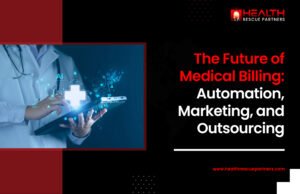
Medical billing has long been a challenging and time-consuming process for healthcare providers. Managing medical billing efficiently has become more demanding with constantly evolving regulations, insurance policies, and coding requirements. Many healthcare professionals wonder: Could medical billing be automated? The answer is a resounding yes. Automation, combined with strategic outsourcing and effective patient acquisition marketing, is revolutionizing how private practices manage their finances and grow their patient base.
Could Medical Billing Be Automated?
Automation is transforming the healthcare industry, and medical billing is no exception. By influencing artificial intelligence (AI), machine learning (ML), and robotic process automation (RPA), healthcare providers can significantly reduce errors, enhance efficiency, and improve cash flow. Automated billing systems can handle claims processing, insurance verification, payment posting, and patient invoicing with minimal human intervention. This reduces administrative burdens, allowing medical professionals to focus on patient care rather than financial paperwork.
Benefits of Automating Medical Billing
The advantages of automating medical billing extend beyond saving time. Automated billing systems help reduce coding and claims processing errors, leading to fewer claim denials and improved reimbursement rates. They also ensure faster payment processing by submitting claims and following up promptly. Additionally, automation reduces administrative labor costs associated with manual billing and data entry. Compliance is another significant advantage, as AI-driven billing solutions help healthcare providers adhere to the latest healthcare regulations and coding updates. Furthermore, patients benefit from accurate and prompt invoices, improving transparency and trust in the billing process.
Challenges in Medical Billing Automation
While automation offers numerous benefits, it is not without challenges. Implementing an automated billing system requires investment in technology and staff training. Data security and patient privacy must also be a top priority when integrating AI-driven billing solutions. However, with proper planning and compliance measures, automation can significantly improve the efficiency and profitability of medical practices.
Healthcare Marketing and Patient Acquisition
Effective healthcare marketing strategies are essential for the growth of any medical practice. As competition in the healthcare industry intensifies, providers must leverage digital marketing, patient engagement tools, and reputation management to attract and retain patients.
Digital Strategies for Patient Acquisition
With the increasing reliance on digital platforms, medical practices must adopt SEO strategies to ensure their websites appear in search results when potential patients look for healthcare providers. Social media engagement on platforms like Facebook, Instagram, and LinkedIn allows providers to connect with patients through informative and engaging content. Content marketing, including blogs and educational resources, helps establish medical professionals as trusted authorities. Positive patient testimonials and ratings on online review platforms significantly impact patient acquisition rates. Additionally, as virtual healthcare grows in popularity, marketing telehealth services can help practices attract patients seeking remote consultations.
Enhancing Patient Retention
Acquiring new patients is only part of the equation. Retaining them is just as important. Personalized patient experiences, appointment reminders, and follow-up care increase patient satisfaction and long-term loyalty. Automated email campaigns, chatbots for instant patient support, and loyalty programs can enhance retention rates and encourage repeat visits. Establishing strong patient-provider relationships ensures continued growth and sustainability for healthcare practices.
Outsourcing Billing in Private Practice
As the complexities of medical billing increase, many private practices are turning to outsource billing services to reduce administrative burdens and improve financial performance. Outsourcing medical billing allows healthcare providers to delegate billing tasks to specialized companies that handle claims processing, insurance verification, and revenue cycle management.
Benefits of Outsourcing Medical Billing
Outsourcing medical billing offers several advantages. Professional billing companies stay updated with the latest regulations, ensuring compliance with healthcare laws and reducing the risk of claim denials. They also maximize revenue collection by optimizing claim submission processes and reducing errors. Time savings is another key benefit, as outsourcing allows healthcare providers to focus on patient care rather than spending hours managing billing paperwork. Additionally, outsourcing provides a scalable solution to handle increasing billing demands as medical practices grow without hiring additional staff.
Choosing the Right Medical Billing Partner
When outsourcing medical billing, selecting a reliable and experienced billing partner is crucial. Providers should look for a company with a proven track record in handling medical billing for private practices. The chosen partner should use advanced billing software that integrates seamlessly with the practice’s electronic health records (EHR) system. Transparent pricing is another important factor, with no hidden fees. Finally, patient data protection should be a top priority, so choosing a billing partner that complies with HIPAA regulations is essential.
Approach to Medical Practice Growth
The future of medical billing and patient acquisition lies in combining automation, marketing, and outsourcing for a streamlined and efficient healthcare practice. Medical providers can optimize revenue cycles and enhance patient satisfaction by influencing automated billing solutions, implementing strategic patient acquisition marketing, and outsourcing billing operations.
The Future of Healthcare Billing and Marketing
As healthcare technology evolves, automation and AI will play an even more significant role in medical billing. Integrating chatbots for patient inquiries, blockchain for secure transactions, and predictive analytics for revenue forecasting will revolutionize medical billing. Additionally, healthcare marketing strategies will become more personalized, influencing big data and AI-driven insights to target specific patient demographics. The future will see a more seamless and efficient approach to medical billing and patient acquisition, ensuring healthcare providers and patients benefit from these advancements.
Conclusion
Medical billing is transforming with automation, digital marketing, and outsourcing services. Could medical billing be automated? Absolutely. By integrating AI-driven billing solutions, healthcare marketing strategies, and outsourcing billing in private practice, medical providers can enhance efficiency, increase revenue, and provide a better patient experience. As the healthcare landscape evolves, adopting these strategies will be essential for private practices to stay competitive and thrive in the modern medical industry.





